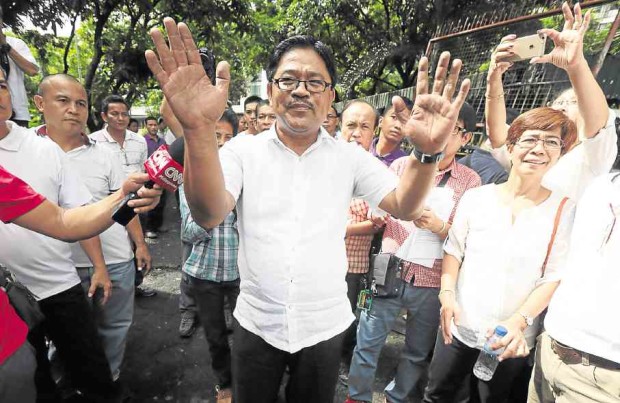
THE APPOINTMENT of peasant leader Rafael Mariano as secretary of the Department of Agrarian Reform has raised farmers’ hopes for a swift and massive distribution of lands. GRIG C. MONTEGRANDE
SARIAYA, Quezon—While welcoming President Duterte’s order to stop land conversions, land reform beneficiaries in the province are asking the President to pay attention to what they consider as a more serious problem—their land titles being revoked.
“Please also hear us, Mr. President. Our case is different,” said Romeo Clavo, head of farmers’ group Ugnayan ng Magsasaka sa Gitnang Luzon.
“We already own the lands awarded to us by the government then they revoked our Cloa (certificates of land ownership award) and returned it to the landowners,” Clavo said.
“Getting back the lands that we’ve already nurtured to become productive, and which have become part of our souls, is like killing us,” he said.
Clavo said stopping the conversion of farm lands would benefit thousands of future land reform beneficiaries.
He reiterated the appeal for Mr. Duterte and Agrarian Reform Secretary Rafael Mariano to give their plight the same attention.
“When you (Mr. Duterte) promised that change is coming, it gave us another hope that our Cloa will be returned to us,” said Clavo.
“We’re still waiting for the realization of our prayers. We will never get tired of waiting under your administration,” Clavo said.
Mr. Duterte ordered a moratorium on the conversion of agricultural lands at the first meeting of the Presidential Agrarian Reform Council on Monday.
He also agreed to waive penalties on arrears of farmers who had fallen behind on their amortization payments to the Land Bank of the Philippines.
Clavo said the waiving of loan penalty was a “great relief for land reform beneficiaries.”
Last year, the Court of Appeals dispossessed 255 farmers in Sariaya town of lands awarded to them in 1997 under the Comprehensive Agrarian Reform Program (CARP).
The landowners said their farms could not be covered by land reform as these were classified as nonagricultural in the 1982 zoning ordinance of the Sariaya government, or six years before the CARP took effect.
The Sariaya town council has been discussing problems arising from the 1982 zoning ordinance.
Clavo said 750 Cloa, covering 1,750 hectares, are involved in revocation cases initiated by landowners.
He said the cancellation of Cloa would displace 2,000 families of farmer-beneficiaries.
“If land conversion will not stop, [then] it [will be a] slow and painful death for most us,” Clavo said.
In April, Clavo and some leaders of farmers’ groups in Sariaya joined other farmers in Quezon in a 122-kilometer protest march to Metro Manila to appeal to the Department of Agrarian Reform for the return of their lands. Delfin T. Mallari Jr., Inquirer Southern Luzon

